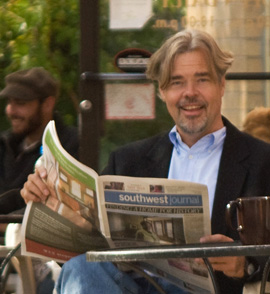This is a posthumous article from one of the leadership team of the organization On the Commons. “At On the Commons, we believe it is possible to remember, imagine, and create a society that goes beyond the constructs and confines of individual ownership. To work on the commons is to work to enliven the deep and ancient memory we all hold of egalitarian and reciprocal relationship, of belonging, of authentic community, and of love, wonder, and respect for the natural world.” This blog entry was posted November 5, 2009. Strange how little has changed. — Ed.

It was a lovely Indian summer afternoon in Minnesota and I enjoyed an invigorating bike ride from my home in Minneapolis to the public library in the nearby suburb of Edina where I talked about the commons to a group of senior citizens studying environmental sustainability as part of a lifelong learning program through the University of Minnesota. It struck me that this experience was a happy alignment of many examples of social commons: public libraries, public universities, public events, civic society, environmental consciousness, lifelong learning classes and even the brilliant reds and golds of the trees I pedaled past.
I speak frequently to groups large and small about the commons and must admit it that my reasons are partly selfish. I enjoy the applause, of course, but even more than that I relish the thoughtful questions from the audience. They challenge me to think deep and wide about how a commons-based would really look. And they almost always teach me new things on the subject.
Today, for instance, a woman inquired about the connection about the word commons and the word “comity.” I’ve come across that word a few times through the years but had to confess to the room that I did not know what it meant.
She explained, with help from others in the audience, that it meant civility, a sense of courteousness to others.
“That sounds like the commons to me,” I declared, and called upon the next questioner, who I hoped, would bring up a topic that I did know something about.
Upon arriving home, I decided to make use of that great commons, the internet, to further explore the word. I discovered that “comity” is a rich little piece of the English language. Wikipedia focuses on its legal meaning of reciprocity—“the principle that one jurisdiction will extend certain courtesies to other nations (or other jurisdictions within the same nations).”
But what really intrigued me was the definition at Merriam-Webster’s Online Dictionary: “a: friendly social atmosphere: social harmony b: a loose widespread community based on common social institutions.”
Now that sounds like what many of us are longing for in this era of isolation, fragmentation, and helter-skelter lives where nothing we do seems to fit together in any natural way. A “friendly social atmosphere” and “common social institutions” seem the recipe for happiness and belonging to something bigger than ourselves.
I especially love that Merriam-Webster traces “comity” back to a blending of the Old Latin word “comis” (courteous) and the Sanskrit word “smayate”(he smiles).
Another site suggested that it was a word once commonly known to well-read people, but it has gradually disappeared from use today. Well, that lets me off the hook for not knowing the meaning when a number of retired people in the audience did. But it makes me glumly wonder if we discarded the word because we have for gotten the idea itself. In the mad rush toward privatized lives and the market as the main focus of our entire culture, we’ve lost our sense of “social harmony” and “loose widespread community.”
But a great thing about social commons—of which the English language is a vivid example—is that they are never completely lost. We can recover the word “comity” and proclaim it loud and proud in our efforts to rest or a sense of convivial cooperative to our lives.
Comity is rising again!
well said Jay, words like that are truly needed these days, along with our awaking to the realities we face in uncertain times.
Thank you,
Tom